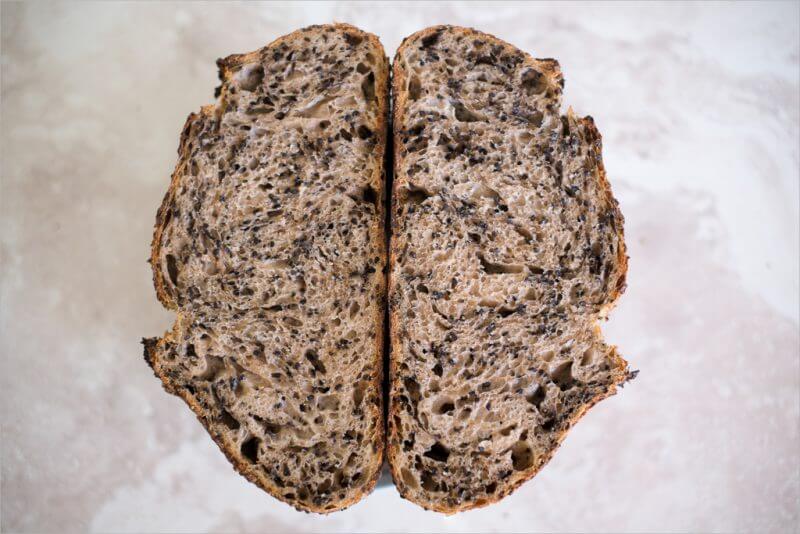What to bake next? That was the question on my mind the past week or so. I was anxious to bake something as my bread supplies started to dwindle and it’s a travesty when we are cooking something great at home and don’t have a slice of sourdough to accompany. The weather here is really starting to grow cold and I was in the mood for something a bit on the rich side, something with a real deep flavor. I took out my trusty Tartine Bread book and flipped through until Chad’s Tartine Country Sesame Sourdough loaf caught my eager eye.
My exposure to sesame seeds has been limited to probably the same foods as most people: hamburger buns, crackers, sprinkled on top a loaf of bread here and there, Asian and Indian food… While I do love the rich taste they bring to buns and other bread, I was a bit skeptical of how they would taste baked throughout a loaf of sourdough. Would it be too intense of a flavor? I decided to bake Tartine’s Country Sesame and find out.
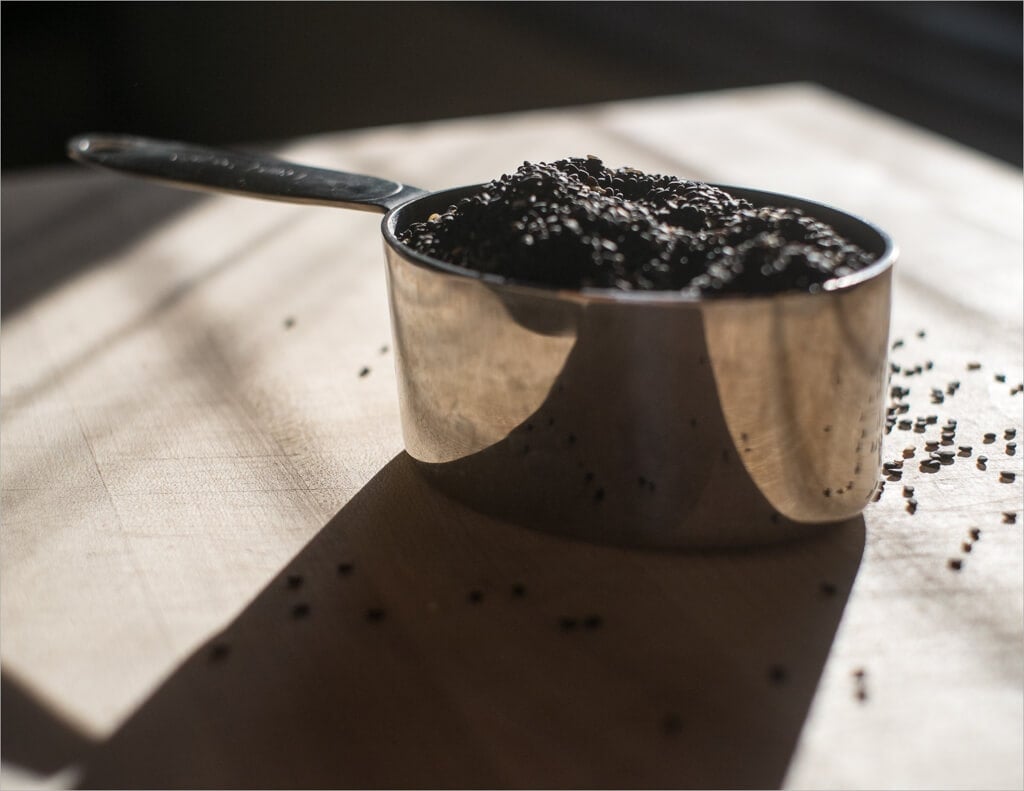
The recipe calls for 1 cup of unhulled sesame seeds, and looking through my kitchen pantry all I could muster was regular old hulled & toasted seeds. I looked at a few markets around town and wasn’t able to find anything close so I turned to Amazon and picked up a bag of these organic unhulled sesame seeds. Shipping was prompt per usual and I was ready to bake over the weekend.
Prepare the leaven – 10:00pm
Friday night I prepared a 100% whole wheat leaven with the following ingredients:
- 30g ripe sourdough starter
- 110g whole wheat flour
- 110g water
After mixing the above in a glass container, I covered and set out on the counter to rest and do its thing overnight.
Mix the flour and water, autolyse – 7:00am
Up early on a Saturday due to work obligations at home, I checked my leaven’s progress. Visibly tiny air pockets throughout and a slight smell of ripe fruit indicated we were ready to go.
Gather up your ingredients and let’s get baking.
Ingredients:
- 250g (25%) of your new leaven
- 800g (80%) white bread flour
- 200g (20%) whole wheat bread flour
- 20g (2%) salt
- 710g Water and 50g (76%) in reserve for the next step
- 1 cup unhulled sesame seeds
Method:
Sesame Prep:
We want to first toast and cool the unhulled sesame seeds. This coaxes even more flavor out and takes the raw edge off.
- Preheat your oven to 400°F (200°C)
- Spread your sesame seeds into a thin layer on a baking sheet
- Bake for 10 minutes, take the baking sheet out and give them a mix
- Bake for an additional 10 minutes
- Set out to cool
The smell from baking these seeds was incredibly intoxicating. It smelled almost like honey to me, and when filling the house, instantly made me want to make some greek yogurt with honey and fresh fruit. And while I waited this is exactly what I did. Who said baking has to be all work anyways?
Dough:
- Add 250g of your leaven to a large mixing bowl
- Pour in 710g warm water and mix with your hands until completely dissolved
- Add 800g white flour and 200g whole wheat flour and mix with your hand until all the dry flour is incorporated throughout
- Cover your bowl with a towel and let it autolyse for 40 minutes
- After 40 minutes add 20g salt to the dough and slowly pour your water on top. Squeeze the dough with your hand to incorporate the salt
- Now reach your hand under the dough and pull one side up and over onto itself. Do this several times until you notice the consistency of the dough to turn very sticky and less wet
- Transfer your dough to a large bowl. Remember you’ll be adding in a cup of sesame seeds so you’ll need a bit more room than usual. Set your timer for 30 minutes
A final dough temperature of 78°F (25°C) is the ideal final dough temperature for the time tables listed in this recipe.
After transferring use your thermometer to take the dough’s temperature (yes, stick it into the dough!). My final dough temp was 78°F (25°C). You really want your final dough temp or DDT (desired dough temp) to be close to this. I’ve noticed this is the “sweet spot” for my baking. Take note of this temperature in your notebook for future reference and adjustment (you have been taking notes of each of these bakes, right?).

Bulk Fermentation – 8:10am
It’s really started to get cold out here and bulk fermentation times needed to be adjusted to accommodate. Keep an eye on how your dough is developing and adjust your bulk times as necessary. Again, if your DDT was less than 78°F (25°C), you might need a longer bulk fermentation step.
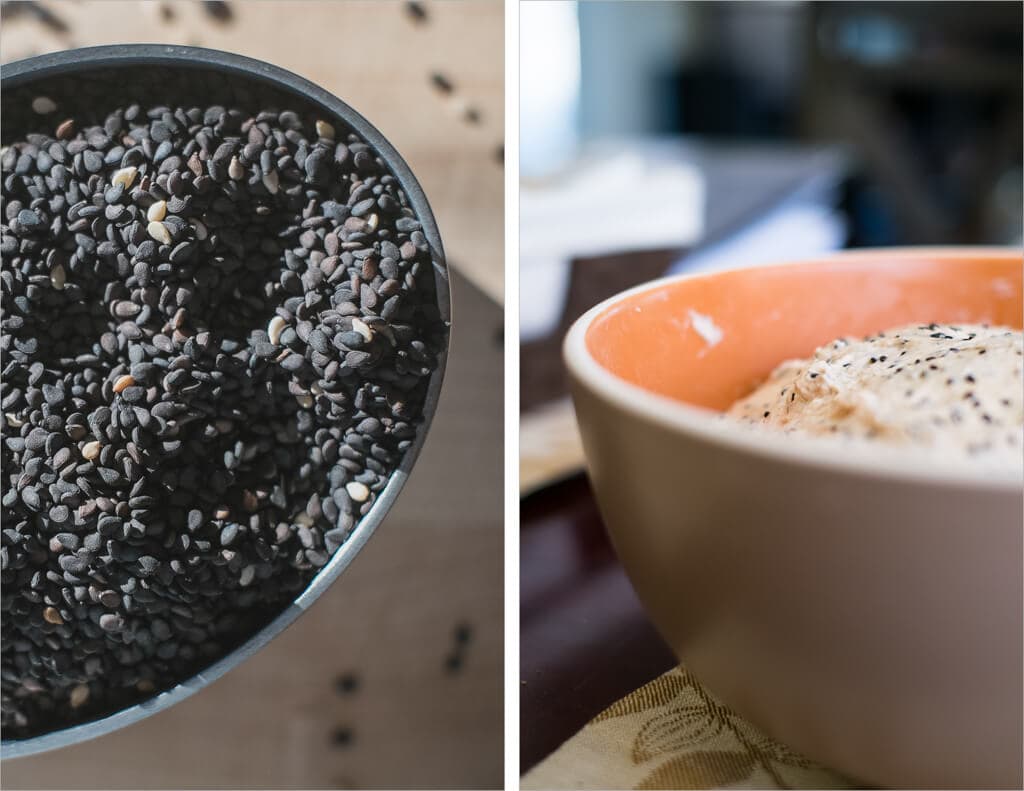
During bulk fermentation you want to do 7 turns spaced out 30 minutes apart. The turns should be vigorous; you really want to grab the dough from the bottom of the container, pull it up high, and then tuck it in on the other side. This high lift, and somewhat forceful turn, builds gluten strength in your dough which helps it rise later in baking.
- 8:40am – Turn 1
After the first turn is complete, add all your sesame seeds and mix them into the dough by cutting them in the dough with your fingers. If things feel a bit dry, add just a tad of water. I had to add about a tablespoon or so.
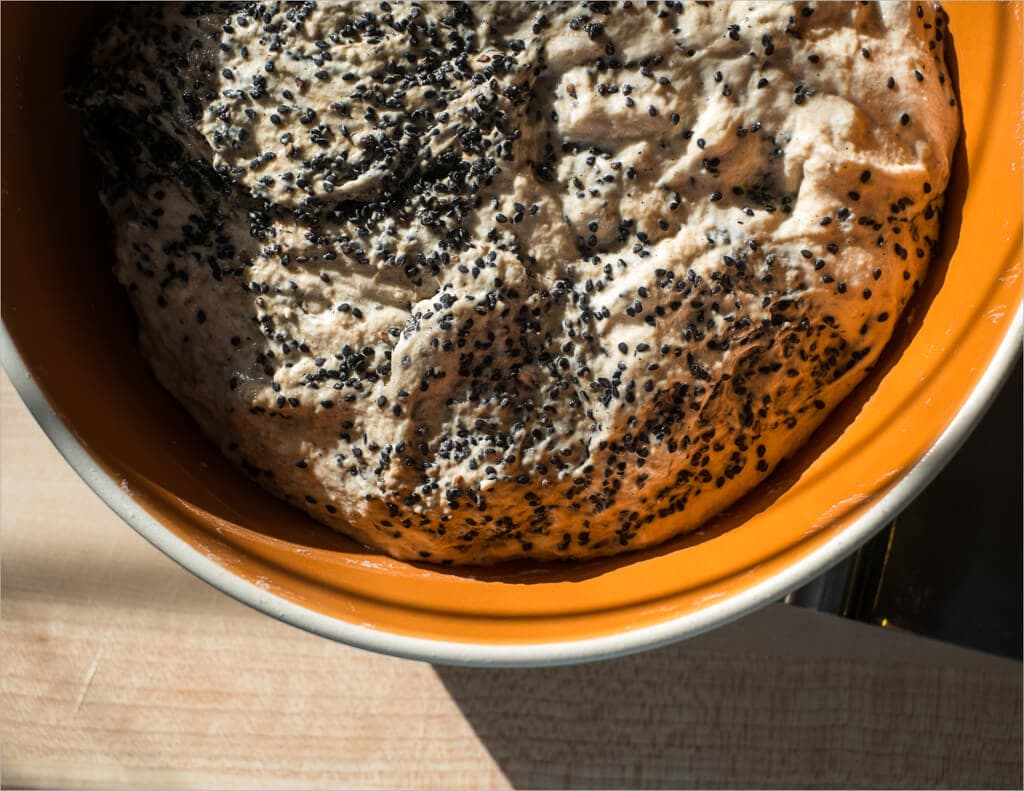
- 9:10am – Turn 2
- 9:40am – Turn 3
- 10:10am – Turn 4
- 10:40am – Turn 5
- 11:10am – Turn 6
- 11:40am – 3:00pm – Rest on counter untouched
At 3:00pm the dough in my bowl had risen at least 30% and there was some serious fermentation going on. Shaking the bowl a bit had the dough jiggling around, nice and full of air pockets.
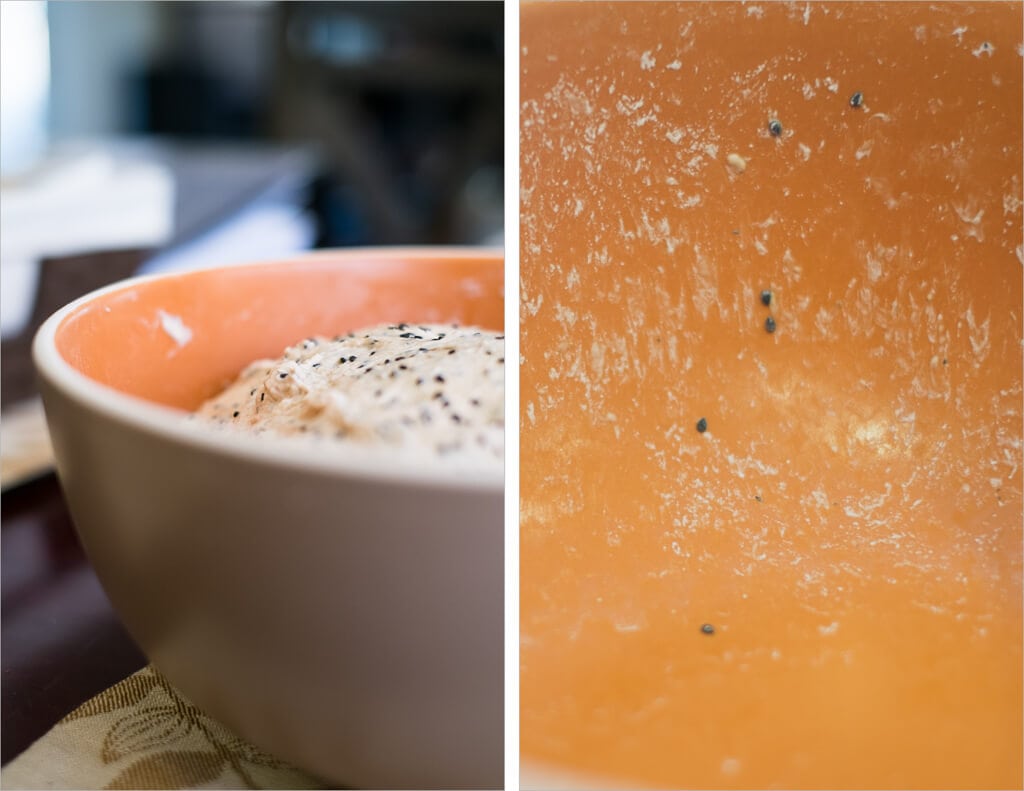
Pre-shape – 3:15pm
Take the dough out of the container onto your unfloured work surface and sprinkle some flour on top before dividing. Divide the mass into two halves and flour at the top of each half. I always make one half slightly larger than the other to shape into a longer loaf (batard). Flip one half over with your dough knife and your hand, then gently bend the 4 sides of the dough from under to the top. Using the knife flip the mass so the new seam is on the counter and spin it a few times to create a bit of tension. Set a timer for 35 minutes and let it bench rest.
Lightly dust two linen-lined bowls or proofing baskets with white rice flour. These bowls will hold our fermenting dough overnight to proof.
Shape – 4:00pm
With the larger half of dough, I shaped into a batard and placed into my oblong proofing basket per usual.
With the smaller half of dough I usually do a little experimenting. This experiment might be a new shaping technique, an increased/decreased amount of surface tension, or something else I dream up. This time I wanted to try and coat the outside of the boule with additional hulled sesame seeds. To do this I first shaped into a typical boule, which resulted in the seam side on the counter. I then took out my handy water mister, misted the top of the boule and grabbed the dough up with my hand and dough knife. I then rolled the top (the part of the dough that will eventually be the top after baking) of the boule on top of a kitchen towel I laid out with a thin coat of sesame seeds. The wet boule picked up all the seeds and they stuck to the top before I placed it top-down into my proofing basket.
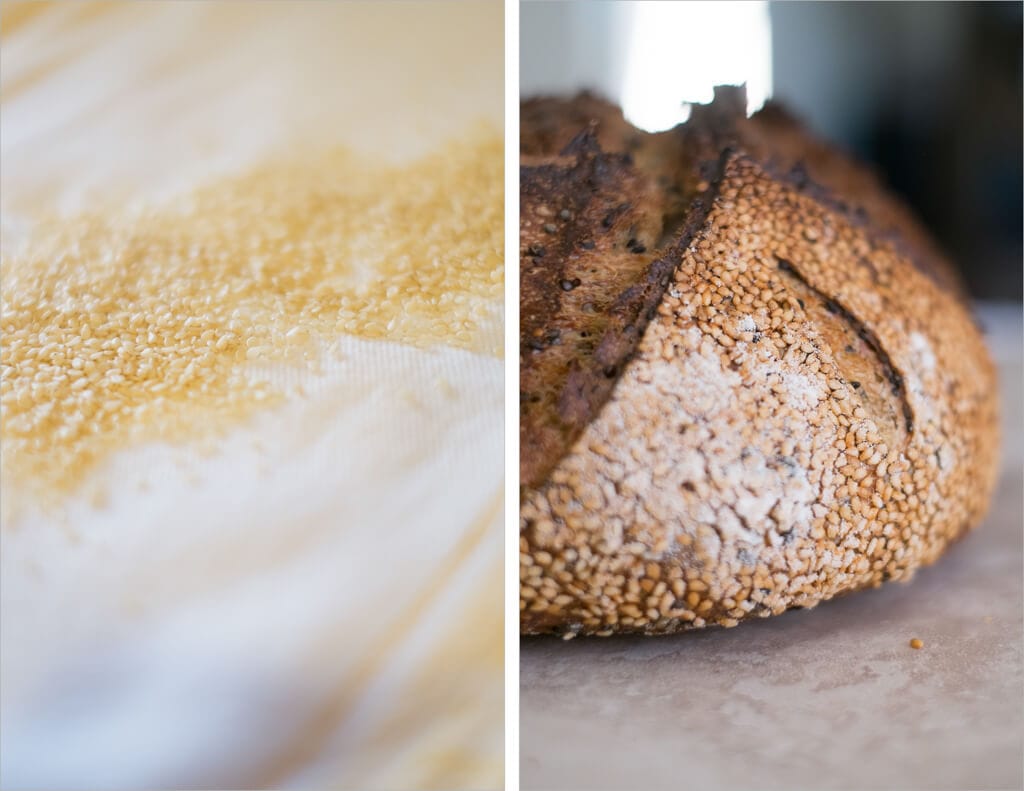
Proof – 4:15pm
Into the fridge goes both the baskets for a nice rest overnight until the morning…
Score + Bake – 7:20am
Gather your tools (for a complete list of the tools I find the best and most used, check out my tools page!):
In the morning preheat your oven to 450°F (230°C). For more information on baking, see my post to baking with a Dutch oven (or combo cooker).
After one hour, take one of your loaves out of the fridge and cut a piece of parchment paper to place on top of the basket containing the dough. Take your peel and then put it on top of those two and quickly invert it so the dough is now resting on the parchment paper and the peel.
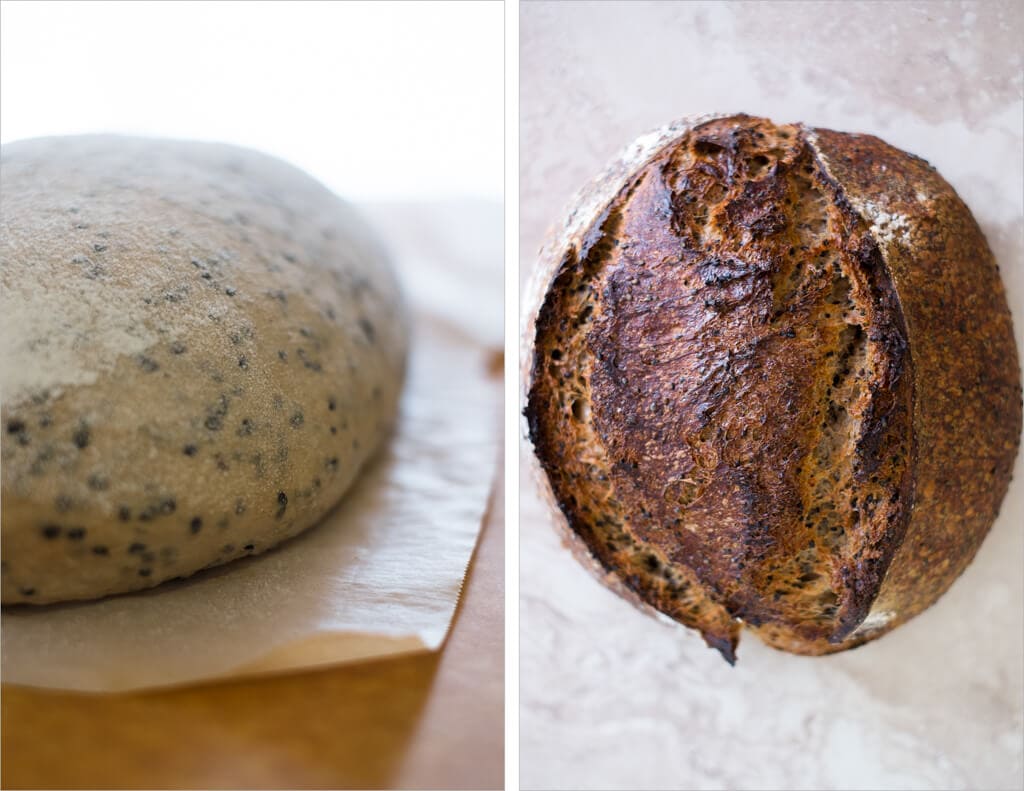
Get your razor blade out and score the top of the loaf to allow the bread to expand while rising in the oven. For the larger batard I did a single slash down the middle starting from the very top to the very bottom. The “experiment” boule (with the sesame seeds on top) I did an “X” with smaller, lighter slashes in-between each section formed by the “X”.
Place the dough into the combo cooker, cover with the lid, and bake for 20 minutes with the lid on. After this time, open the oven, remove the lid of the pot (you can place it on the rack next to the bottom side or remove it to cool), close the oven door and bake for an additional 35 minutes. Repeat for the second loaf.
For more tips on baking, see my post on baking in a Dutch oven.
Conclusion
The sesame seeds really gave it that deep flavor I was looking for during these colder fall days. It’s a flavor that is a bit polarizing, you either really enjoy this type of bread or you just don’t like it. My wife wasn’t too happy with it, and I think the main reason was that the flavor of the sesame seeds was a little overpowering. Perhaps reducing the amount of toasted seeds will help reduce this problem.
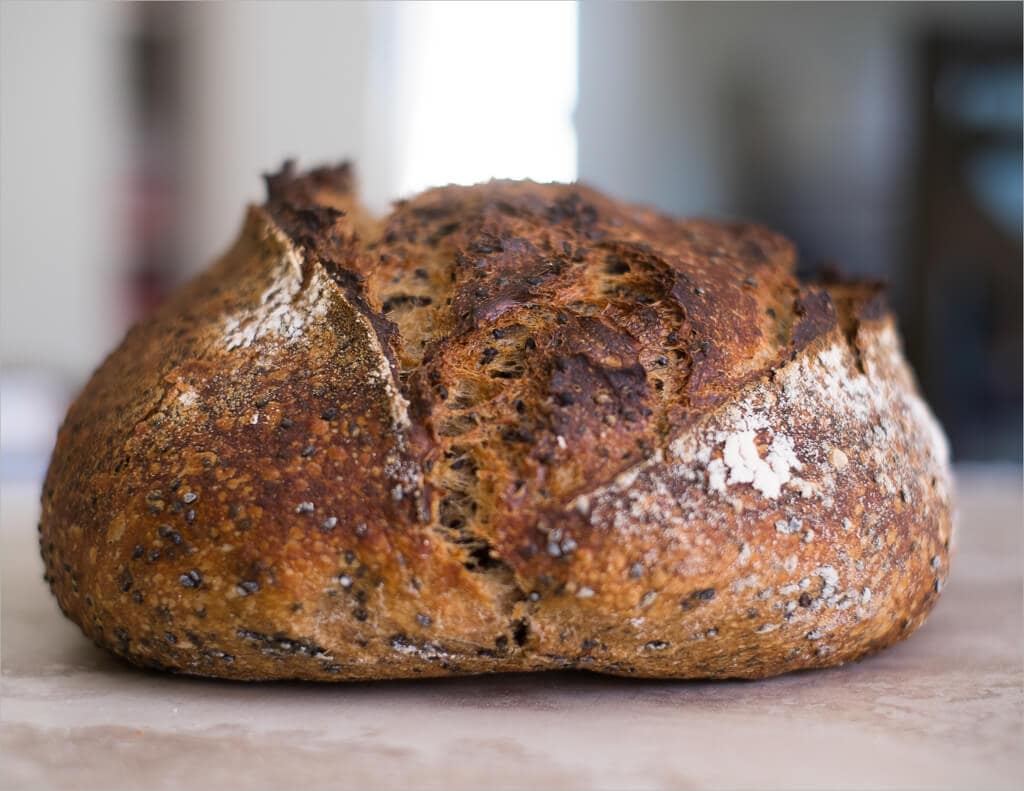
Crust
Nice and brittle. I’m not sure if the sesame contributed somehow here, or perhaps I baked it a tad darker than usual, but I really enjoy the crunchy thin crust here. After a day or two when toasted, the crust really takes on almost a cracker-like feel to it. Because it was so thin this really was superb.
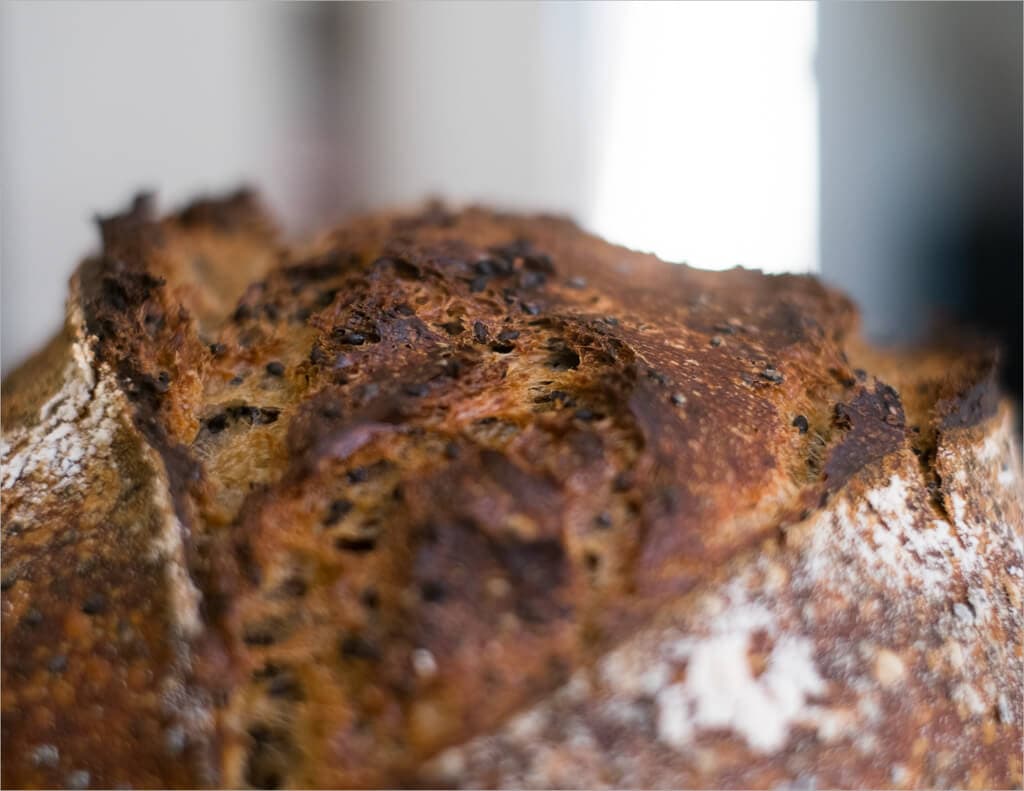
Crumb
A bit on the dense side, but totally acceptable. I’ve read in the literature that adding ingredients such as seeds can actually cut through the developed gluten strands in your dough, preventing a high and open rise. I think the rise is perfectly nice here, but again, the crumb is just a tad on the dense side.
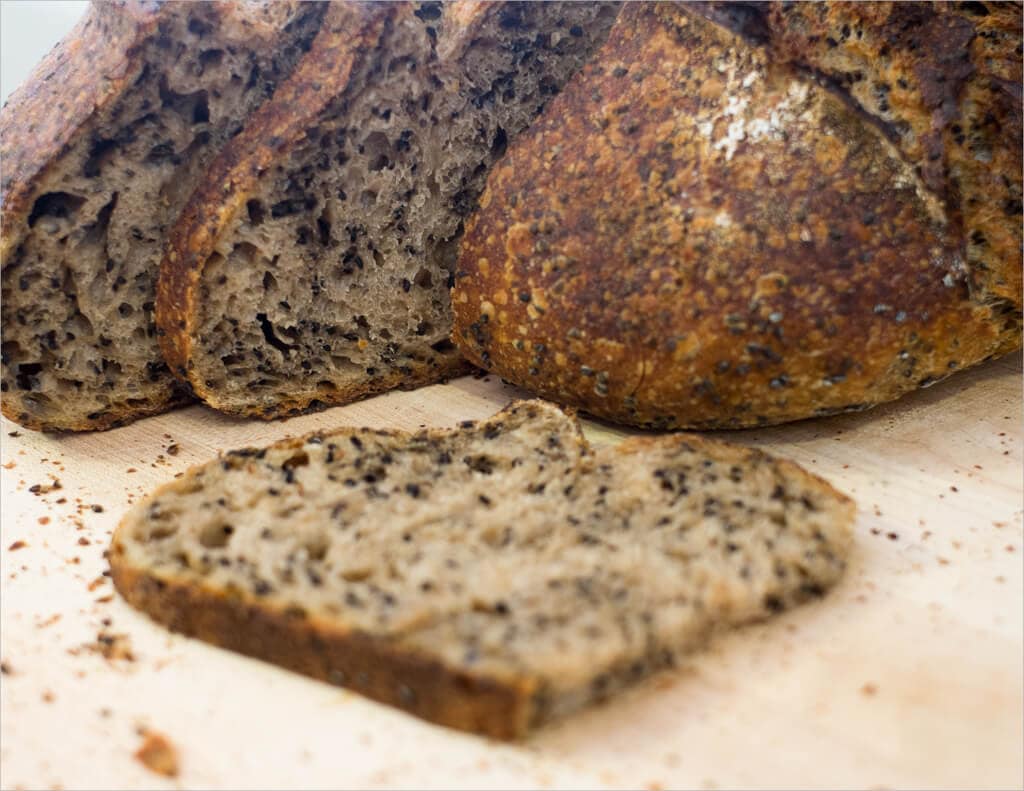
Taste
So. Rich. A very deep and intoxicating taste. Again, next time I’ll try reducing the number of sesame seeds. About 1/2 cup sounds just about right to see if it mellows out some of the intense sesame flavors. While I like the rich taste, I’d like the sesame to play more of a background role and let the wheat shine through just a little bit more.
In terms of sourness, the bread didn’t have all that much. I like it this way, and if your curious about maintaining your starter to keep it “young” and less sour, check out my previous post on managing your sourdough starter’s fermentation.
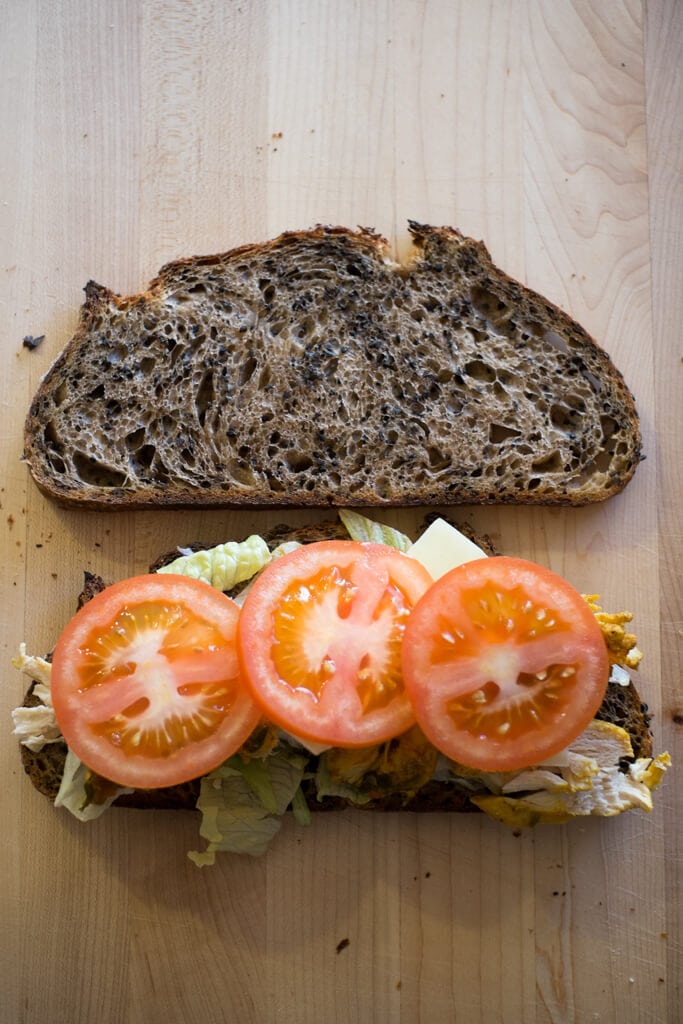
We recently cooked a Moroccan inspired chicken tagine with some really great flavors and I thought it would complement this bread quite nicely. I prepared a sandwich with two slices of this Tartine Country Sesame, Moroccan chicken pulled and cut apart, aged Irish Cheddar, tomato & lettuce, and a small spread of grain mustard. Whew, that’s good…
Buon appetito!
If you use this recipe, tag @maurizio on Instagram so I can take a look!


